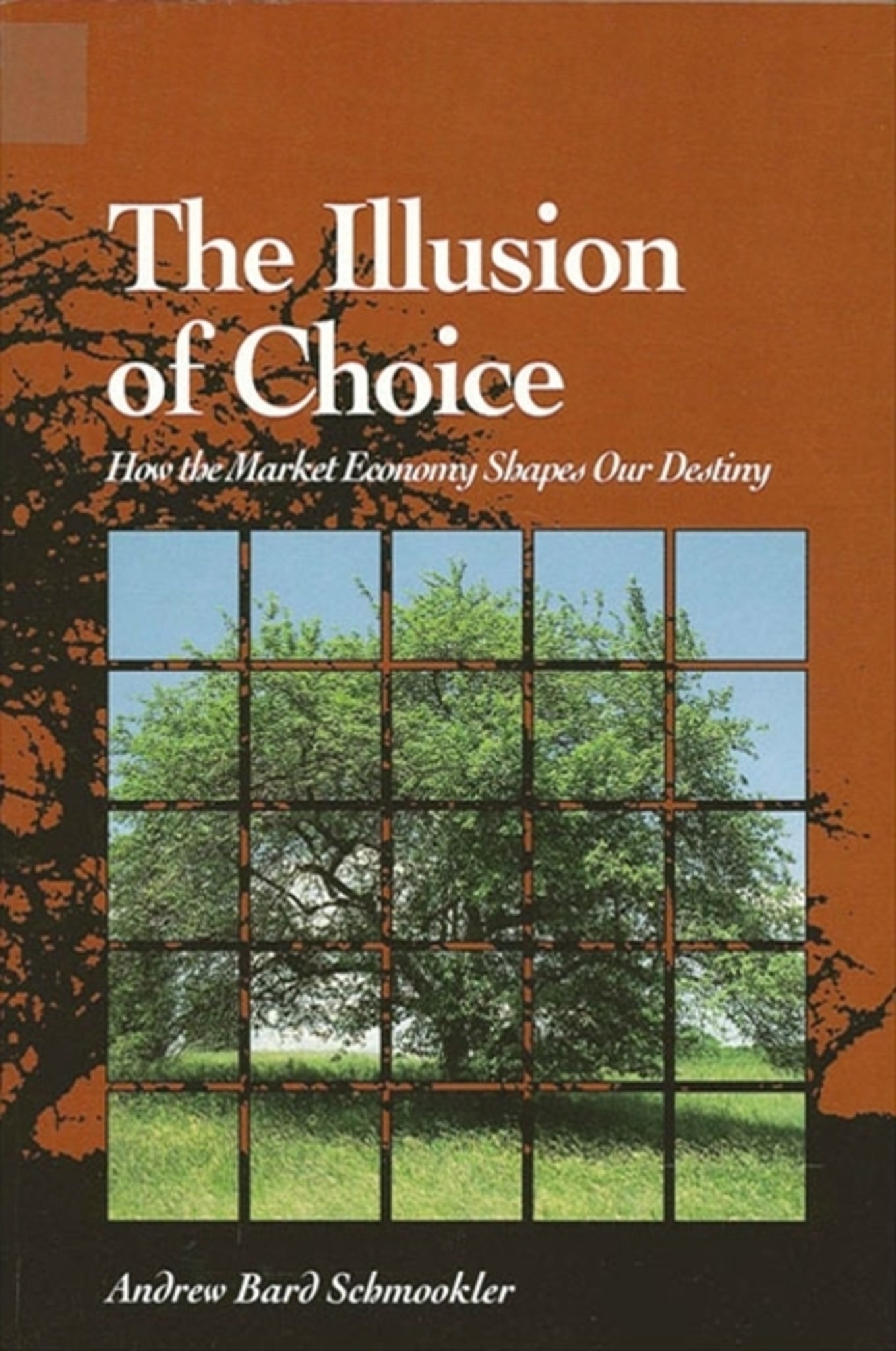We're sorry. An error has occurred
Please cancel or retry.
The Illusion of Choice

Some error occured while loading the Quick View. Please close the Quick View and try reloading the page.
Couldn't load pickup availability
- Format:
-
20 July 1993

The market economy attends well to some dimensions of human life and does not even see others. It is sensitive to those values pertaining to what can be bought and sold but is blind to others that cannot be turned into commodities, such as the integrity of the natural world and the quality of human relationships. The market registers the costs and benefits to transactors acting as social atoms but is impervious to the costs of tearing apart the larger wholes-families, communities, the biosphere-that are vital to the quality of our lives.
In The Illusion of Choice, Andrew Bard Schmookler shows how the market system unfolds according to a logic of its own, shaping everything within its domain-the landscape, social institutions, even human values-to serve its own inherent purposes. This understanding helps illuminate what has been most troubling to generations of Americans struggling to create a more humane society, and provides the conceptual tools by which we can become less the instruments of our powerful systems and more the masters of our destiny.
Here is a powerful critique of the market, not couched in the Marxist economics of surplus value and exploitation, but drawing upon mainstream economics to shows how we all have a stake in making change. Schmookler sets out a program to help us humanize the market, not by overthrowing it but be correcting its biases, not by revolution but by strengthening the democratic process. Perhaps we can now add the most important choice to the abundance of choices the market provides us: the choice of developing into the kind of society we really want to be.


"Hundreds of books discuss the market, but none with this kind of criticism. No one else has written with this deep an insight.
"Schmookler provides an extraordinarily deep, broad, and insightful analysis of the social, political, and moral consequences for our civilization of our dependence on the market system. With elegance of language, he shows how the market presents the illusion of choice while its dynamics determine our mores and our behavior in deep and long-lasting ways." — Lester Milbrath, State University of New York at Buffalo
"I found this work a pleasure to read in several respects: its fine writing, both clear and engaging; its point of attack on the main institution of industrial society, the market; the drawing of difficult and often overlooked implications of the market; and the attempt to address the hoary but necessary issue of the manner of social change for advanced industrial society." — Joel Jay Kassiola, Brooklyn College, City University of New York
Acknowledgments
CHOICES: AN INTRODUCTION
Stranger in a Familiar Land
Of Two MindsPerestroika in America
Is This the World We Want?
Stranger in a Familiar Land
City on a HillPART I: TUNNEL VISION: A RADICAL CRITIQUE OF THE MARKET
The Marxist Challenge
On Beyond Marx
Toward a New Critique
How Dead Is This Horse?
The Challenge Facing Us
1. The Mythology of the Market
The Myth of Efficiency2. Questions of Power and Justice
The Case for Liberty
The Claim of Economic Democracy3. Missing Our Connections
A Glimpse at the Real Problem of Power
A Lesser, Libertarian Claim to Justice
Minding Our Business
Bringing the Externalities In
Small Change?4. Reining In the Market
A Whole Less Than the Sum of Its Parts
Warring Against Community
Divided We Fall
Free People and Unchecked Power Systems5. Devouring the Earth
A Mill that Grinds Slow but Fine
Landscape Roulette
Evils Lesser and Greater
Can We Take Care of Us?
Government Ltd.
Corruptions of Pluralism
Government for Sale
The Possibility of Democracy
Masters of Our Destiny
Worth What We Paid for It6. Not Just the Market
After the Horse Is Gone
Profligate Heirs
Corrective Lenses
Don't Worry, Be Happy, or, Would You Buy a Used Planet from These People?
Flattering Ourselves: The Mystery of ImitationPART II: WE ARE DRIVEN: THE MARKET AS THE ENGINE OF CHANGE IN AMERICA
The Problem of Power
The Parable of the Tribes, or, The Imperatives of Power
7. A Black Hole in American History
Always Head North8. The Will of the People
Despite Objections9. The Transformation of American Values
Lip Service
The Good Old Days Never Were
The Worship of Success10. In the Image of Our Creator
The Value of the Dollar
The Case of the Vanishing Protestant Ethic
A Civilization Out of Balance
North May be the Way to GoPART III: OUT OF CONTROL
Other Dynamics of Change
Beyond Free Will
What's the Use?
Getting Hold of the Steering Wheel
11. Autopilot
The Problem12. The Cult of Growth
A False Solution: The Ethic of Gesture
Toward a Different Approach
"Let the Owners Decide": A Proposal, with Exegisis
Paramount Virtues
The Measure of Value13. Power Struggle
The Wealth-Happiness Connection
Limited Utility
Unshakable Belief
Machines Have Needs, Too
Consumer as Cog
Poverty and the Wealth of Nations
I. Driven to ExcelCONCLUSION: ENVISIONING THE GOOD LIFE
Freedom or NecessityII. Imperatives of Survival
Spurious Necessities
National Economics in the Struggle for SurvivalIII. Seeking to Free Ourselves from the Trap of Necessity
Economics as Arms Race
Mourning Lost Choices
War on the CheapIV. Power in a World Free of Force
The Displacement of War by World Order
Choosing Together
Treat a Problem as a Problem
The Imperatives of the Market
Protection
Wealth and Power in the Ordered Polity
Buying Influence
Breaking Free
A Meditation on Past, Present, and Future
Romanticizing the PastNotes
Resurrecting Our Humanity
The Girl Who Can't Dance
Bigger Vision
Bibliography
Index



